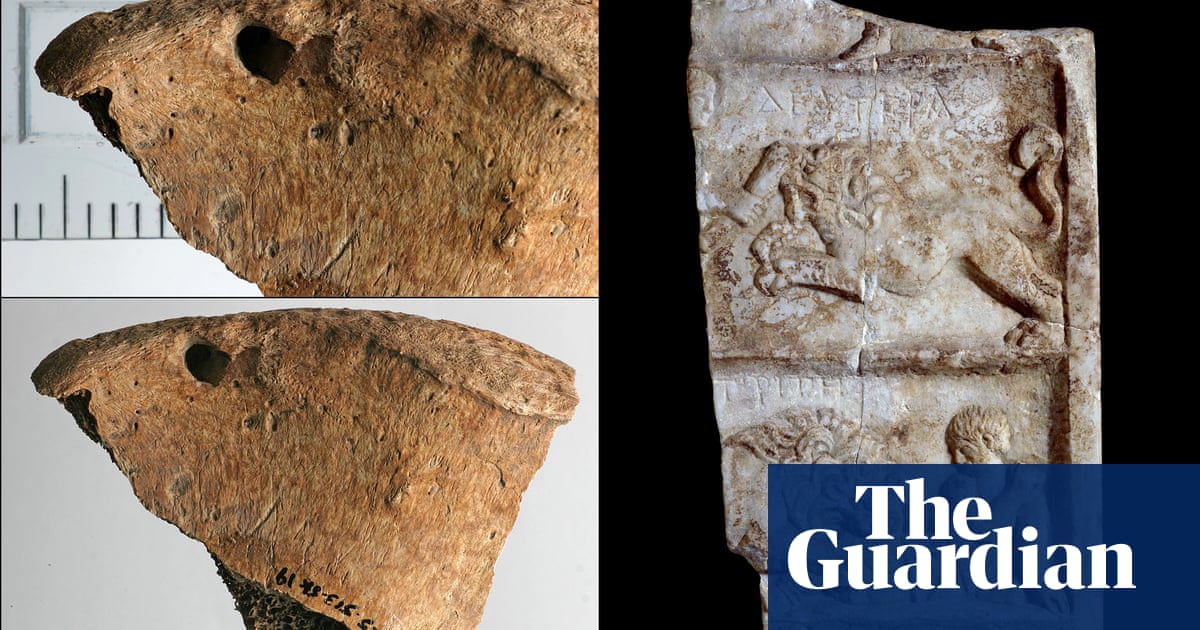In his heroic yet tragically short life, Elvis Presley was many things to many people: leather-clad hip-gyrating sex symbol; corruptor of youth; symbol of the American dream; helpless addict; king of rock’n’roll; challenging husband; guzzler of banana and peanut butter sandwiches; ultra-committed Christian. But a new book argues that the singer whose looks, voice and charisma changed so much more than music was one further thing: the world’s greatest occult magician.
“He was a multifaceted seeker,” says Miguel Conner, who became obsessed with the King after an ayahuasca ceremony in 2022, ayahuasca being a psychoactive drink often used in cleansing rituals. “Somebody who sought the larger questions of life. He was a man of prophecy, of experience – and my thesis is that he was the greatest magician in western civilisation.”
Conner makes this argument in The Occult Elvis: The Mystical and Magical Life of the King, a book that gathers material from sources including Priscilla Presley, the clique of Presley’s associates known as the Memphis Mafia, and spiritual advisers such as his personal hairstylist and guru Larry Geller. It’s difficult to tell how much Conner has his tongue in his cheek and this is also how his book plays out: as a sort of spiritual biography peppered with Conner’s own theorising and lashings of Jungian analysis.
Conner is not the first to take such an approach. Presley’s spiritual life has been examined elsewhere, in books such as David Rosen’s The Tao of Elvis, first published in 2001, and Elvis: Between the Lines: His Quest for Higher Consciousness as Told Through His Notes. The latter, which was published two years ago and was written by Ingrid De La O, was a trawl through Presley’s extensive – and annotated – library of books.

“Elvis read over 1,000 books about different facets of new age spirituality,” says Gary Tillery, author of 2013’s The Seeker King: A Spiritual Biography of Elvis Presley. “He was very serious about it. He wanted to leave music at one point to start his own commune – and bring young people into this new age of spirituality through kriya yoga.”
In The Occult Elvis, meanwhile, we learn of Presley’s talent for weather manipulation, one day waving his hands to clear rain from the sky, so two friends could play racquetball at his Graceland court. Longtime fan Wanda June Hill also appears, with her revelation that the King divulged to her that he was not from this planet, but rather hailed from Jupiter’s ninth moon. The book also details Presley’s belief in extraterrestrials and his claim to have had several UFO encounters, once telling his bodyguard Sonny West: “If they make contact, we can’t be afraid, because they are not going to hurt us.”
Conner, who lives in northern Illinois, sees Presley not so much as a David Blaine or Derren Brown, but more like a dark magus, along the lines of countercultural mid-century magician Aleister Crowley, who founded the religion of Thelema. “Do what thou wilt,” was its guiding principle. “A magician is always known by the system they leave behind,” says Conner. “With Elvis, he left us rock music.”
To the sceptically minded, some of this will require not so much a pinch of salt, but a Graceland-sized helping. Yet Conner is a scholar of gnosticism, a broad field of Christian mysticism, and hosts the Aeon Byte Gnostic Radio podcast. He argues that Presley became the US’s “egregore”: in occult parlance, that is a non-physical, demigod-like manifestation that takes on a life of its own after being created by the will of a collective. From his earliest days, Conner writes, Presley was surrounded by strange happenings: he supposedly received psychic guidance from his stillborn twin brother, Jesse; and he recalled to girlfriend June Juanico that, as a boy, he would astrally project himself into the stars.

Presley’s parents had met through Pentecostalism – which, with its emphasis on direct communion with God via faith healing and rhythmic dancing, influenced musicians from Presley to Little Richard, BB King, Jerry Lee Lewis and Johnny Cash. “Rock music was never just a form of entertainment,” says Conner. “It was a sort of shamanistic spirituality. These guys were all Pentecostals and they were hated in the 1950s. Other Christians were saying, ‘You’re mixing sex and Jesus a little too closely.’”
And of those “shamans” it produced, Presley was undoubtedly the biggest. But, although the Pentecostal movement influenced his music, he was abandoned by the church and condemned by his childhood pastor, James Hamill, who claimed the star was caught in Satan’s web. Perhaps this is what led Presley, who remained a Christian, to reject the “hellfire and damnation” approach of the church, as he once put it, and instead embrace the idea of God being in each of us, as espoused by much new age literature at the time.
But it wasn’t until almost a decade after Presley began his career that an appointment with a celebrity hairdresser, Geller, caused his spiritual life to rocket. After a styling session, the two supposedly struck up a lengthy conversation about philosophy and matters of the spirit, prompting Presley to study eastern and western esoterica, from numerology to meditation. Geller said the singer spoke to him about telepathic visions he’d had with aliens when he was eight, including one featuring a future Elvis in a white jumpsuit (he didn’t know what the images meant at the time).
Presley would take hundreds of books on tour, writes Conner, cloistering himself away to annotate works such as Kahlil Gibran’s Sufism-tinged collection of fables, The Prophet, or the 1947 quasi-gnostic text The Infinite Way, by mystic and lecturer Joel S Goldsmith. The singer pondered metaphysical, existential questions, and carefully read the works of mystics, including Helena Blavatsky, Manly P Hall and George Gurdjieff. It all seems a far cry from Hound Dog.
“He considered himself a faith healer,” says Tillery, who recalls being “amazed” when he learned the extent of Presley’s spiritual life. The writer heard one story about a friend of Presley’s who had been in a motorcycle accident and was now in hospital dealing with excruciating pain. “Elvis visited him,” says Tillery, “and spent 30 minutes waving his hands over the guy’s back – and he said it was amazing. The pain was almost all gone. He hadn’t had any relief for two weeks.”
Presley was not public about his spiritual inclinations but nor did he hide them. He was “ahead of the hippies”, says Conner, and travelled to an ashram, or spiritual retreat, in Mount Washington, New Hampshire, to hasten his spiritual evolution. He practised martial arts, in particular karate, becoming a black belt and an instructor. Not only did he meditate, adds Conner, he would read Tibetan Buddhist incantations on stage. He wore an ankh, the ancient Egyptian hieroglyphic symbol of life. Later, when he became interested in Jewish mysticism and Kabbalah – long before Madonna – he wore a chai pendant, along with his cross, once joking that he “didn’t want to be left out of heaven on a technicality”.

By the 1960s, hippies had caught up and alternative spiritual systems were becoming extremely popular. Many pop stars dabbled in the occult, including David Bowie and Jimmy Page of Led Zeppelin, the latter purchasing Boleskine House by Loch Ness, where Crowley once lived. But, as John Lennon supposedly once said, before Elvis Presley there was nothing. Conner says rock was “led by high priests like Presley and Little Richard and so many others” and became a “form of psycho-spirituality that allowed individuals to cope with this new empire called the United States – this space-age, mass-media era we were entering”.
The US empire and its obsessions came to bear on Presley himself: in the sky above the Arizona desert, Geller claimed, he saw the face of Joseph Stalin morphing into that of Jesus, a representation to the singer of both the antichrist and Christ, as well as the forces of darkness and light within him. Presley is said to have uttered: “The face of Stalin turned right into the face of Jesus, and he smiled at me, piercing my heart and every fibre of my being with his light. I’ll never have to doubt again.”
Conner says: “This vision was that of the ultimate evil, Stalin – this was at the height of the cold war. But what he realised was that the evil was inside of him, too. He felt he wanted this darkness wiped away or cleansed, and if it destroyed him, he was fine with it.” After this vision, adds Tillery, Presley felt “he had a role to play in the betterment of humankind, and he could do it through music and making people feel better, and hopefully open up their minds to more spirituality”.
That mission was cut short. The singer died in his bathroom at the age of 42, while reading A Scientific Search for the Face of Jesus by Frank O Adams, according to a 2022 article in the Daily Express. But a torrent of strange accounts poured forth about the King after he died, including a string of sightings taken up by the tabloids and collected in Raymond A Moody’s 1987 book Elvis After Life. “When you look at Elvis apparitions that still happen today,” says Conner, pointing to the Graceland website where visitors can record their own, normally prosaic sightings, “he’s up on the level of sasquatch, Jesus and the Virgin Mary.”

.png) 2 months ago
24
2 months ago
24













































